UK-based family-run Warner’s Distillery was co-founded by Tom and Tina Warner-Keogh in 2012.
In its early days, the company focused on its domestic market and gin portfolio, made on-site with botanicals plucked from the approximately 250,000 plants grown at its Falls Farm in Northamptonshire in the English Midlands.
Today, the business has expanded its range to include spiced rum, two non-alcoholic spirits and a new spirits brand, Trash & Treasure. Over the past year, Warner’s Distillery has also increased its international presence, being sold now in 30 countries globally, including the UAE, Australia and more recently the US.
Just Drinks sat down with co-founder Tom Warner to discuss the company's expansion plans, prospects for gin in the UK and why spirits producers must adapt to the rapidly changing needs of consumers.
Fiona Holland (FH): Where are your main markets? Do you have expansion plans?
Tom Warner (TW): I think we [were] probably [a] bit late to internationalising the business. The first sort of four or five years, we were very much UK-centric. I think some of our peers within craft probably internationalised a little bit earlier than we did but then I think we grew quicker than they did in the domestic market, which is quite often the easiest market to manage and arguably the most profitable market you're ever going to get… since about 2017, we started with part-time bespoke export resource, and then that grew… probably 15 to 20% of revenues [are] now international…
Our lead market is one of our youngest markets and that's the USA. We launched in the US last September, so we're 12 months in [that] market. Volumetrically, it's already our biggest market. We're in 19 states, which is arguably too many because we're not one of the big boys to be able to just spend a load of money on advertising. It's really liquid to lips, it's still the best, and having sales representatives that are passionate about our brand.
FH: Are you sold across the US?
TW: We've only just launched in Texas, so we're not out on the West Coast yet, hopefully getting into Cali[fornia] a little bit. The stock should be in-market now and it should be starting to happen. High hopes in [the] West Coast for the non-alc... We started with four gin variants, then our importer really wanted the honeybee gin that we produce because they see a lot of excitement around honey-based products in America, so we've shipped some of the honey gins. There's five gin SKUs out there, which, again, arguably, if we're trying to be focused... We've got too many SKUs already but we've also shipped our two non-alc [products] which there's a lot of excitement about from the importer.
FH: Are you looking to enter any new markets or categories?
TW: New markets, yeah. I think if it's right we will and we picked up an Italian distributor at ProWein this year. They want to stand behind us… and they had an opening in their range for a premium gin… We're just waiting for the first order, so that will be opening up soon. We're not going to be chasing desperately for new markets. I think it's try and sell more to the ones that we're already in and, if something appears that makes sense, then we would look at it.
Then in terms of categories, obviously Warner’s is now very well-known for gin but we also do our non-alcoholic spirits, which is an exciting area of growth for us. We do a spiced botanical rum within Warner’s, which we haven't really done a huge amount with. It's a very intelligent spiced rum and we make it like we make gin but we're using a white Dominican Republic rum base, distilled with a lot of homegrown ingredients, the core one being dandelion root…
We've also just launched a new brand, which is a pretty mad thing to do considering the shoestring budget we've got as a business but it was such a cool concept we couldn't not do it. The problem we've got is every retailer we show it to absolutely loves it and lists it but the general public don't know what it is. It's called Trash & Treasure… Trash & Treasure is taking waste streams from other manufacturers that they were going to throw in the bin and turning them into something super tasty… we’ve got a lemon vodka that takes lemon peels from a juicing factory, we've got a tropical rum that takes pineapple and mango skins from a prepared fruit factory… a banana rum that takes overripe bananas from a big banana wholesaler that's near us and we’ve got a [drink] that takes raspberries that are too wonky, overripe, juicy, to go to the supermarket and turns them into a raspberry vodka.

FH: Is Trash & Treasure only being sold in the UK for now?
TW: Yeah, it’s already grown a bit of arms and legs. It's got a huge amount of distribution. We've got to try and drive rate of sale and raise awareness for consumers. Internationalising that brand, my long-term dream would be to contract manufacture it in each market it goes to with waste from that market.
FH: How are you looking to raise consumer awareness of that brand?
TW: It’s a more aggressive price point than Warner's. It's not a bespoke bottle, it's an off-the-shelf bottle. It's an easy-to-apply label. Everything about Warner's was geared to that super-premium gin. It's hand-labelled, the way we make the liquids is expensive. Trash & Treasure, we've tried to engineer everything to be as aggressive as possible. It's a £26 RRP ($34.33). It's aimed at arguably, a younger demographic than Warner's because I think they're more cause-led… that whole initiative, it's B Corp-certified because it's part of Warner's distillery portfolio… using business is a force for good in the world via actively reducing waste or promoting nature, but also that stakeholder engagement.
FH: Gin is still a key focus in the Warner’s Distillery portfolio but you’ve also expanded into new categories. Is that because you’re seeing a decline in gin?
TW: There's a decline in gin [in the UK], there's too many people. There was a real magic in gin [in] 2015/16, and I think [with] relatively low barriers to entry, there's been a herd of people come into it. Most of the stuff that's out there, even within craft, what's the real point of difference? Because a lot of the craft guys just use the same ingredients that the big boys do. I think the key about craft is, at the scale we operate, we can use better ingredients. We should be able to make better-tasting natural product[s]. Because, the big guys, when they're having to make millions of bottles and send it down a production line, they just cannot use that type of ingredient. I think there's a dilution of messaging…
We’re going to see probably a fair amount of rationalisation in gin over the next 12 months or going forward.
I think we're going to see probably a fair amount of rationalisation over the next 12 months or going forward. I think it's interesting, depending on the retailer, gin still the third-largest spirit category, and I think we're very good at talking it down. What went wrong for gin was 2018… all the bars and all the shops put too many gins on the menu and it just became this ocean of options and choice. The consumer became confused.
FH: How important are your non-alcoholic spirits to the business? Are you looking to grow this portfolio?
TW: Off a low base, it's the fastest-growing part of the business and we're definitely looking at one additional variant within the non-alc range, which would be probably a more predominantly citrus-driven one. The mindset I've got to is eventually we will have generations already that [have] never drunk gin, so why am I trying to make something that tastes like gin?... What I'm trying to make is authentic, tasty spirits without alcohol that taste fantastic and deliver on that ritual for the consumer...
At the moment, we've got a [new] recipe that I think we'll be probably bringing out over the next 12 months and we're also looking at RTD… because it brings trial into the brand at a cheaper price point. We're looking at [that] within Warner's alc and non-alc and Trash & Treasure, initially just alcoholic variants for the brand.

FH: What do you see as the main drivers of growth for Warner’s Distillery in the next year?
TW: I think the main drivers for growth for the business in the year ahead [are] probably maintain distribution and try and win new [distribution], because even for Warner's, we're not in all retailers, on- and off- trade at the moment, there's growth to be had there. We've had nearly 200 customer accounts through the farm this summer, doing our nature tours, to really dial people into what we do and why we're different. It's following up on all of that and trying to build and grow with them, grow with our existing and try and acquire new [customers] within Warner's, and that's alcoholic and non-alcoholic sort of growth… internationally, probably the focus is more so on the USA.
FH: Are you present more in the on- or off-premise and why is that?
TW: I think that a lot of the on-trade see us as a great tasting British premium brand that works at gross margin for them on the cocktail menus or their drinks venues, and also is a signpost that they are supporting ESG initiatives… I think in the off-trade at the moment it's a bloodbath, so there are certain off-trade retailers that Warner's is too expensive to be in. The retailers that we are, we're at the top end of the price point and there's a cost-of-living crisis. It's a very hard coliseum to be in, [a] gladiatorial ring… I think we all know that there's been a recessionary-style spending by consumers since prices sort of erupted with energy costs. There's no confidence being delivered by the [UK] government at the moment. Normally, in a recession, you see a polarisation occur. We may just be seeing signs that that's starting to happen now in terms of premiumisation, of people treating themselves at home…
FH: What are some of the major challenges facing the spirits sector right now?
TW: [In the UK] I'd say cost-of-living crisis is obviously one, duty is another. Probably changes in consumption, in terms of moderation, especially as you go further down the age demographic, what are [people] that are starting to drink now going to be drinking in the future? How hospitality is going to have to change to cater for that as well.
I think the traditional wet-led pub, we need to evolve. Experiential [drinking] I think is going to be an area that that needs to be driven within the on-trade.
We're doing so much online now… I think the changing technology, AI, the way people socialise, meet up, is evolving at a really fast pace, so understanding that, and we're going to have… people that are around 35 onwards, that are sort of that analog generation, and catering for them, whilst catering for the new generation and their wants… I do think it’s about that continual innovation, evolution. It's the old Darwinian saying: it's not the strongest that survive, it's those most adaptable to change.

FH: Besides moderation, what consumer trends are you expecting to drive the spirits category in the next year?
TW: My hope would be authenticity and the green agenda would be the ones that you want to drive the category, whether that's true or not. I think Tequila's having a bit of a heat-up at the moment. Rum’s definitely having a renaissance. Whether it will go quite as crazy as gin did, is yet to be seen, but I do think there is definite buoyancy within that category. I think interesting flavours, interesting serves, always going to be important for the consumer…
I think connecting people to what's really, truly matters, that’s real ingredients that do well for the planet as well, supporting nature, using waste, that's what we all need to be focused around. Now, whether that becomes a super-sexy TikTok trend, because it normally seems to be something that's pink and shiny, I don't know… we need to be making the green agenda luxury and cool.
FH: How do you think we can get more consumers to care about the environment and the impact of their buying choices?
TW: It's difficult because everyone just wants an easy solution. I don't know, maybe David Attenborough needs to do a gin brand rather than Ryan Reynolds. It's that kind of stuff, that kind of stakeholder that needs to do it to drive awareness. Because at the moment, you look at all the celebrity-endorsed stuff that's out there, and people are buying it, and they're doing it because of the association, but it's not really driving agendas for change. It's all about commercialising and making money.









